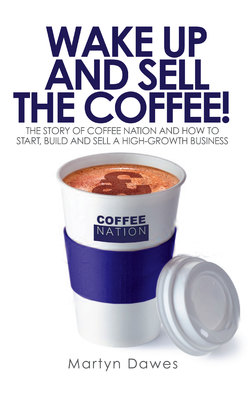Читать книгу Wake Up and Sell the Coffee! - Martyn Dawes - Страница 18
На сайте Литреса книга снята с продажи.
Quest for funding
ОглавлениеBaker Tilly were delighted with the progress I was making and they (Christine specifically) became a trusted friend on the journey. They suggested I set up a factoring facility as I was going to be invoicing small retail businesses (Spar and Alldays were the names over the door but they were essentially independents offering broadly the same offer under an umbrella brand).
Factoring would mean I would get up to 90% of the value of an invoice paid to me within seven days. The factor also provided a full credit management facility to collect payment from each location. Their fee was a reasonable £6k in year one, which seemed a small price for the peace of mind it would bring.
My £50k that I had invested into the business was only going to go so far and with a commitment of 30 trial locations and each machine costing around £1000, not to mention the cost of the cabinet the machine would sit on that would house the cups and lids, I was going to require additional funds.
The first port of call was to meet a bank and my accountant arranged a meeting with RBS with a view to securing a Small Firms Loan for £100k. This, perhaps alongside an overdraft facility and the factoring arrangement, was considered sufficient to reach 200 stores trading in year one.
A letter from RBS landed on my desk on 11 March. It stated they could not take the proposal forward given “the unproven nature of the product.” They appreciated the progress I had made with Spar and Alldays, but wanted to see “firm orders in place from retailers before finance could be granted.” They also wanted to see my funding committed to establishing “a small number of machines producing realistic sales and profits and this micro market would give further credence to the assumptions in my business plan.”
Of course this was a blow, although Baker Tilly weren’t surprised. Nonetheless, I had to listen to RBS’ feedback, understand it and work out what to do to address these issues. I took every positive word as an indication I was on to something exciting. Given I had been able to secure exclusive pilots with two retailers representing over 3000 locations in the UK, I was confident it would only be a matter of time before we could be back at the bank doing the deal. That confidence was to be sorely tested many times in the coming months.
Fortunately, I was able to set up a business bank account with Barclays in Soho Square and secured a £30k overdraft with the help of an introduction from my accountants.
I spent time thinking about the structure of the business and decided I needed an operations manager to work alongside me. He or she would lead the day-to-day management of the business, overseeing each installation and working with each site to maximise sales. They would likely come from a fast moving retail background.
I decided to appoint a recruitment firm and do the job properly. I appointed Berkeley Scott Selection who were specialists in retail and food business recruitment. We ran a full page advertisement in The Grocer in March 1997. I went with their suggestion for the header “Magic Beans? Seriously! Coffee Nation has a bold objective; to make cappuccino an everyday drink in the UK by offering self-serve dispensers in the out of home marketplace.”
By late spring I had found my man. He had been an area operations manager with Holland & Barrett, the health food retailer. He was sharp, highly articulate and had a great track record. He also stood out as wanting to make a conscious decision to join an early-stage business. We negotiated a package and he joined me. His name was Lou. He would be on £30k with a bonus and company car. I was now starting to spend real money and was ultimately responsible for someone else’s livelihood.
Baker Tilly was setting me up with various business angel groups and wealthy individuals who invested in early-stage businesses. I met with Beer & Partners, a leading source of business angel investment in the UK for growing small businesses. I came close and several angels were interested, but I wasn’t able to close a deal.
I started to realise that one could spend a great deal of time with potential investors, many of whom very rarely invested in anything. Even if they did go on to invest, they may not be right for me and my business. Personal chemistry would be critical unless they were completely out of sight after investing. It seemed to make more sense to have someone on board who could add real value.
